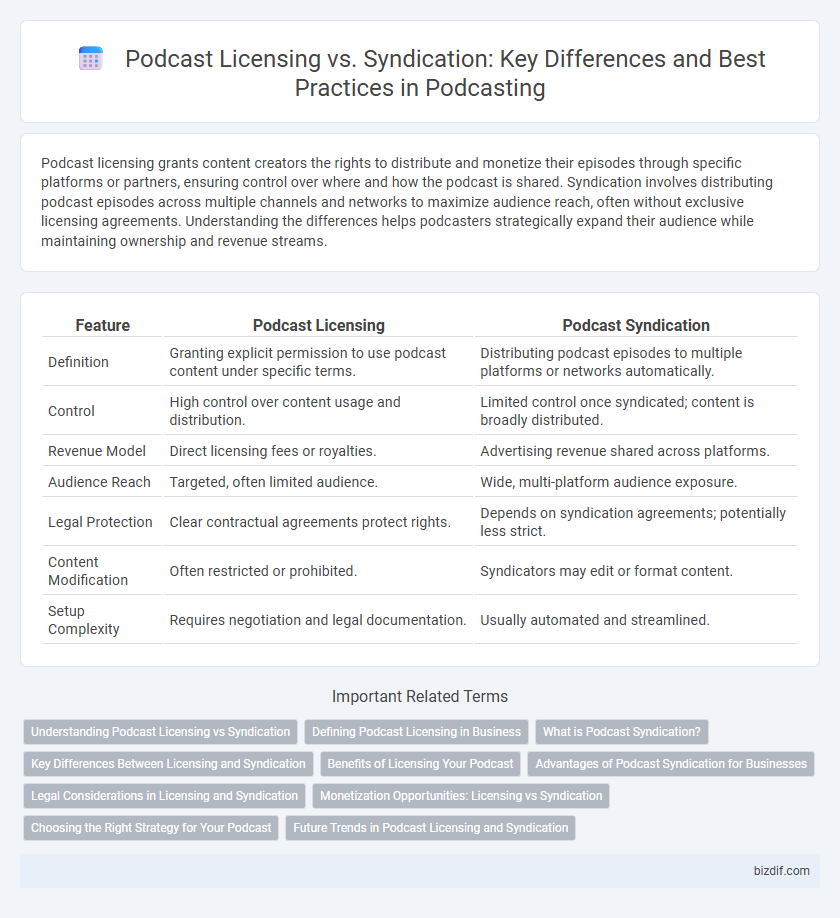Podcast licensing grants content creators the rights to distribute and monetize their episodes through specific platforms or partners, ensuring control over where and how the podcast is shared. Syndication involves distributing podcast episodes across multiple channels and networks to maximize audience reach, often without exclusive licensing agreements. Understanding the differences helps podcasters strategically expand their audience while maintaining ownership and revenue streams.
Table of Comparison
| Feature | Podcast Licensing | Podcast Syndication |
|---|---|---|
| Definition | Granting explicit permission to use podcast content under specific terms. | Distributing podcast episodes to multiple platforms or networks automatically. |
| Control | High control over content usage and distribution. | Limited control once syndicated; content is broadly distributed. |
| Revenue Model | Direct licensing fees or royalties. | Advertising revenue shared across platforms. |
| Audience Reach | Targeted, often limited audience. | Wide, multi-platform audience exposure. |
| Legal Protection | Clear contractual agreements protect rights. | Depends on syndication agreements; potentially less strict. |
| Content Modification | Often restricted or prohibited. | Syndicators may edit or format content. |
| Setup Complexity | Requires negotiation and legal documentation. | Usually automated and streamlined. |
Understanding Podcast Licensing vs Syndication
Podcast licensing involves obtaining legal permission to use copyrighted material within a podcast, ensuring protection of intellectual property and adherence to distribution rights. Syndication refers to the distribution process where podcasts are shared across multiple platforms or networks to reach a broader audience, often without altering the original content. Understanding the distinction between licensing, which governs content usage rights, and syndication, which focuses on content dissemination, is crucial for podcast creators to navigate legal compliance and maximize audience reach effectively.
Defining Podcast Licensing in Business
Podcast licensing in business refers to the formal permission granted by content creators to companies or platforms, allowing them to distribute, reproduce, or monetize the podcast episodes under specific terms. This legal framework ensures intellectual property rights are protected while enabling revenue generation through advertising, sponsorships, or subscriptions. Licensing agreements often include rights management, territorial limitations, and duration, distinguishing them from syndication, which primarily focuses on broader distribution without explicit commercial rights.
What is Podcast Syndication?
Podcast syndication is the process of distributing a podcast's audio files and metadata to multiple platforms and directories, expanding its reach and audience without altering its original content or licensing agreements. This distribution method allows podcasters to effortlessly share episodes across various apps like Apple Podcasts, Spotify, and Google Podcasts, increasing discoverability and listener engagement. Unlike licensing, syndication focuses on providing broader access to the same content rather than granting specific rights for usage or reproduction.
Key Differences Between Licensing and Syndication
Podcast licensing grants specific rights to use content under defined terms, allowing control over distribution, modification, and monetization. Syndication involves distributing a podcast across multiple platforms or networks to widen audience reach without transferring ownership rights. The key difference lies in licensing's emphasis on content control and legal permissions versus syndication's focus on broad content distribution and audience expansion.
Benefits of Licensing Your Podcast
Licensing your podcast grants exclusive rights to content distribution, enabling creators to monetize their work through strategic partnerships and tailored agreements with platforms or brands. This controlled exposure enhances brand value and ensures consistent revenue streams while protecting intellectual property from unauthorized use. Licensing also facilitates broader audience reach by leveraging established networks without losing creative ownership.
Advantages of Podcast Syndication for Businesses
Podcast syndication offers businesses expanded reach by distributing content across multiple platforms, increasing audience exposure beyond a single host site. It enhances brand visibility and authority by leveraging established networks and aggregators, driving higher engagement and potential customer acquisition. Syndication also simplifies content management and amplification, allowing businesses to focus on creating quality episodes while benefiting from automated distribution and monetization opportunities.
Legal Considerations in Licensing and Syndication
Podcast licensing involves securing explicit permissions for content use, ensuring compliance with copyright laws and avoiding infringement. Syndication requires legal agreements that govern distribution rights and royalties, protecting both creators and platforms from unauthorized replication. Understanding these legal frameworks is essential to mitigate risks and maintain control over intellectual property in podcasting.
Monetization Opportunities: Licensing vs Syndication
Podcast licensing grants content creators direct control over monetization by allowing them to sell usage rights to specific platforms or advertisers, often generating higher revenue per license. Syndication expands audience reach by distributing the podcast across multiple channels, increasing ad impressions and potential income through broader ad network participation. Licensing offers exclusive monetization deals, while syndication leverages volume and scalability for revenue growth.
Choosing the Right Strategy for Your Podcast
Podcast licensing grants exclusive rights to distribute content, ensuring controlled use and potential revenue from specific platforms, while syndication allows broader distribution across multiple channels, increasing audience reach without relinquishing ownership. Selecting the right strategy depends on goals such as monetization, audience growth, and brand control; licensing suits creators prioritizing exclusive partnerships and higher income, whereas syndication benefits those seeking widespread exposure and diverse listener bases. Evaluating platform compatibility, target demographics, and long-term objectives is critical for maximizing podcast success.
Future Trends in Podcast Licensing and Syndication
Podcast licensing is evolving with increasing emphasis on exclusive content rights, enabling creators to monetize intellectual property more effectively. Syndication is expanding through automated distribution technologies, broadening audience reach across multiple platforms. Future trends highlight blockchain integration for transparent royalty tracking and AI-driven analytics to optimize licensing agreements and syndication strategies.
Podcast licensing vs Syndication Infographic

 bizdif.com
bizdif.com